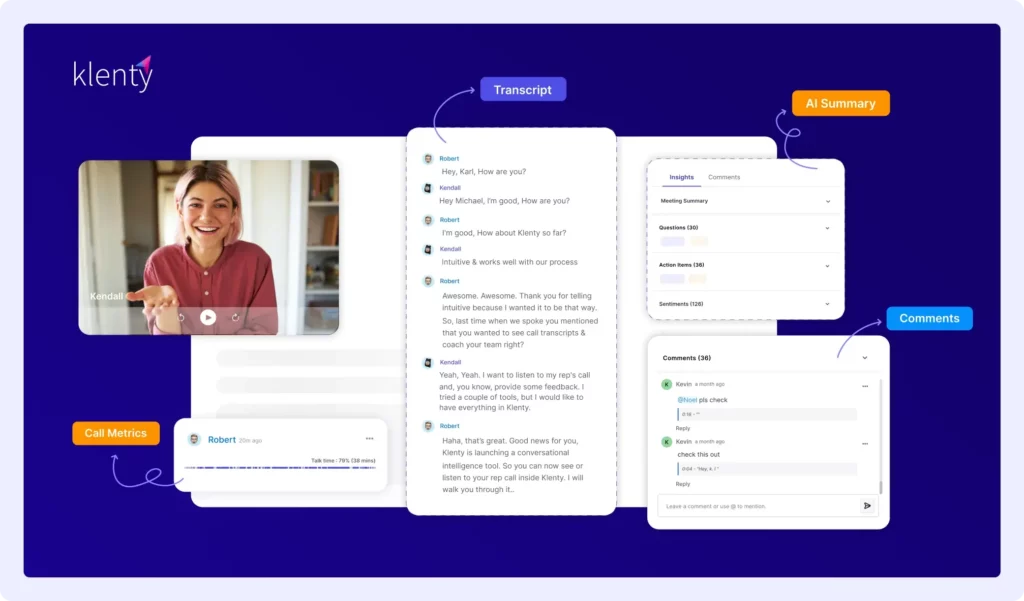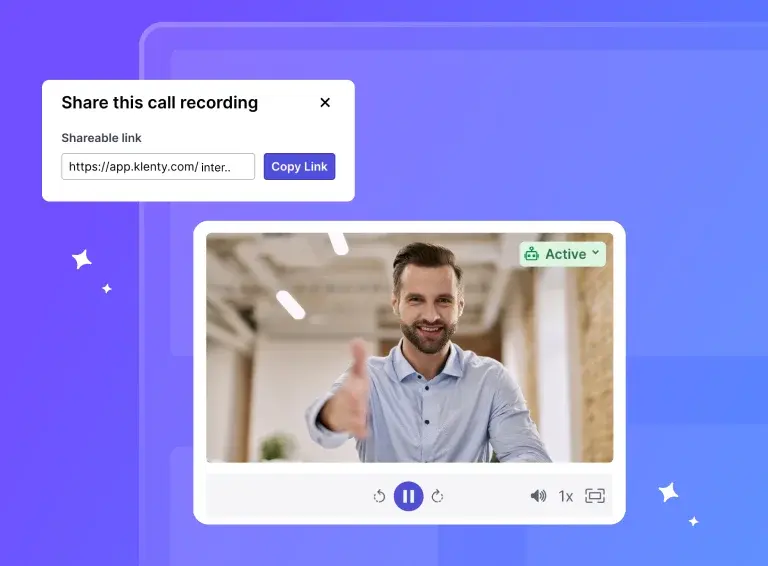Effective sales calls are the key to closing deals and achieving success. However, navigating them can often be a bumpy ride.
From objections to price negotiations, sales reps face the challenge of understanding and convincing prospects at various stages of the sales cycle.
To move past them effectively, it is essential to have a pre-call plan that's well thought out.
In this blog, we'll equip you with a step-by-step pre-call planning guide and a comprehensive template to turn challenging sales calls into victorious conversations and close those deals.
What Is Pre-Call Planning in Sales?
Pre-call planning is the preparation that sales teams do to have a successful sales call with the prospects. It involves gathering all important information about them and their organization before the call happens. This helps them stay organized and navigate the conversation confidently.
Pre-call plans vary depending on the type of calls you're making—discovery, demo, or negotiation.
For example, if you're making discovery calls, you need to research the prospect’s pain points, company, and industry trends to be able to ask thoughtful questions to understand their needs further. But if you're making demo calls, your pre-call planning will revolve around understanding your product thoroughly and creating a customized sales demo.
What Are the Benefits of Pre-Call Planning?
Preparing for a sales call helps sales reps outline the goals for the call and chart out the best way to steer the conversation toward them. Here's why putting in the effort to prepare before a sales call is worth it:
- Reduce the Uncertainties of Sales Calling
Sales call planning helps you prepare for the unexpected so you can handle potential obstacles and objections like a pro. A well-thought-out strategy is like a blueprint that ensures you won't be caught off guard. This reduces the guesswork, leading to a more productive and successful conversation.
- Build Confidence
Preparing for a sales call helps you become well-versed with your product and the prospect. It helps you move through the conversation confidently and with a sense of assurance that can be felt by your prospect. When they see you as a knowledgeable and credible advisor, they'll be more likely to close the deal.
6 Steps To Create an Effective Pre-Call Plan
Whether you're making a discovery call or negotiating the final deal, a pre-call plan equips you with the knowledge, confidence, and strategy to carry out a successful sales conversation. It helps you leave a lasting impact on the prospect and close deals with finesse.
Here are 6 essential steps that will help you create a structured pre-call plan:

1. Research Your Prospects
Of course, we had to start with the obvious. You can do pre-call research in three simple ways:
- Start with their social media handles (LinkedIn, Twitter, etc.):
- Pay attention to recent posts, professional background, and shared connections.
- Use this information as conversation starters to build rapport.
- Use sales intelligence tools:
- Look for insights on their company’s tech stack.
- Learn about recent funding rounds and company developments.
- Tailor your sales pitch to align with their current needs and challenges.
- Set a time limit for research:
- Allocate a maximum of 3-5 minutes per prospect.
- Focus only on important information to avoid getting lost in irrelevant details.
Top-performing AE, Jan Benedikt Mundorf, swears by Kyle Coleman's 5X5 approach. Before a call, he spends 5 minutes gathering 5 facts about his prospect. These include:
- Headcount growth
- Tool stack
- Job advertisements
- Prospect’s background
- Company’s mission
2. Analyze Prospect's Competitors
A strong understanding of your prospect's competitors can be a powerful weapon in your pre-call sales planning arsenal. It serves 2 purposes:
- Helps you have a comprehensive approach and convince prospects how your product can help them get ahead of their competitor.
- Positions you a trusted advisor.
This helps you boost the effectiveness of your demo and negotiation calls. You see, when you know what your prospect's competitors are up to, you can position your product in a way that highlights how it can help the prospect outperform them.
It also makes it easier to customize your pitch to directly address their shortcomings and show how your product can be a strategic choice. By helping the prospect to achieve their goals instead of just selling, you can become a trusted advisor and provide an overall better buying journey.
For example:
- “We've noticed your competitors facing challenges in [specific area]. How has your experience been with that?”
- “[Competitor 1] and [Competitor 2] are gaining a competitive edge through [specific strategy]. Have you considered similar strategies for your business?”
3. Set a Goal for the Sales Call
Before getting on the call, make sure you have a clear answer to this question: "Why are you calling them in the first place?"
Do you wish to schedule a demo, a follow-up meeting, or close the deal?
This will give your sales call a sense of purpose and help you determine the:
- Tone and approach: If you're aiming to close a deal, your tone may be more persuasive and focused on building urgency.
- Call duration: Determine how long the conversation should ideally last to ensure you cover all important points without rushing through it or dragging it on.
- Agenda and topics: A structured agenda ensures you don't miss any important points and keeps the conversation on track.
- Possible objections: When you understand the purpose of the call, it becomes easier to identify any objections or concerns that the prospect might have. This helps you prepare to handle them effectively.
4. List Out Open-Ended Questions
Open-ended questions are inquiries that cannot be answered with a simple yes or no. They encourage the prospect to provide a more detailed and thoughtful response. This helps you build better rapport and understand their needs effectively, leading to meaningful sales conversations and a better chance of closing the deal.
Your open-ended questions should show that you've done your research and are genuinely interested in the prospect.
As a rule of thumb, avoid asking questions that can be easily answered with a yes or no or with a quick Google search. Dive into specific details about your prospect's industry, challenges, or business developments. This helps you gauge their intention and drive the conversation towards the goal.
"I start the call off by asking insightful questions that are going to engage them," says sales expert Mark Hunter. "Be prepared with a list of questions that are relevant to their industry, to who they are, to their business."
And while you're at it, make sure you pose these questions naturally. You don't want your potential customers to feel like they're in an interview.
Here are some examples of pre-call planning questions you can use:
- "What would you say are your biggest challenges in achieving [goal]?"
- "Are there any trends or innovations among your competitors that have caught your attention?"
- "How satisfied are you with your current solution, and what aspects do you find most valuable?"
- "Could you describe a recent situation where your existing processes or solutions fell short of your expectations?"
5. Prepare for Objections
When it comes to sales, objections are part of the game. Therefore, preparing for them is a crucial step in your pre-call planning process.
Start by listing common objections you've encountered. These could be concerns about pricing, competitors, or specific features. You can also dig a little deeper to identify objections that may be unique to your prospect's company or industry.
Once you've identified potential objections, it's time to develop concise and persuasive responses. They should not only address the prospect's concerns but also turn it into an opportunity to provide value. You can discuss the responses with a colleague or a mentor to refine them and handle objections comfortably.
But while it's humanly impossible to predict every single objection, you can prevent them by addressing potential concerns before they arise. For example, if you see pricing is a common objection, you can discuss it early in the conversation and highlight the value your product delivers.
"The key to successfully addressing sales objections is to 1) expect that it's coming and, 2) instead of waiting for it, bring it up yourself," says sales expert Jill Konrath.
6. Keep Support Material Handy
Being well-prepared for a sales call isn't just about what's in your head but also about having the right resources at your fingertips. This will help you to back your claims up and provide valuable information to the prospect.
You can gather:
- Relevant case studies or success stories to show how your product has benefited your customers.
- Product documents, such as technical specifications or user guides, to answer related questions confidently.
- A clear pricing breakdown or a customized offer to nudge the prospect to make a decision.
- Whitepapers or brochures to provide in-depth information about the product or industry trends.
Identify the most suitable resource that fits the objective of your call and is relevant to the prospect. Organize them well so you can access them easily at the right time.
Having the right materials handy helps you address objections confidently and boosts your credibility. They allow you to navigate the nuances of the call smoothly and move closer to your ultimate goal.
Sales Pre-Call Planning Template
To make your pre-call planning smoother and more manageable, we give you a handy template that covers everything. Follow the steps in this template to get fully prepared for your calls.

With this comprehensive pre-call planning checklist, you'll be well on your way to zipping through the sales call with confidence and boosting your chances of success. Make sure you adapt and customize it for each prospect for the best outcome.
How Call IQ Helps in Pre-Call Planning
If you’ve made it this far, you now have almost everything you need for successful pre-call planning.
There’s one more thing you can do to supercharge your plan: Analyzing your previous calls using conversation intelligence software.
And look no further than Call IQ to help you analyze your calls. Call IQ instantly gives you different kinds of insights and summaries from your sales calls that enhance every step of your pre-call planning.

The platform automatically generates AI-driven summaries and transcripts, which helps you to understand what worked and what didn’t in your previous calls. These insights will enrich your pre-call plan by helping you foresee different scenarios and prepare accordingly.
For instance, you can observe the kind of objections raised by the prospect in your previous calls using Call IQ’s summaries to anticipate any possible objections in your upcoming calls. And, if they mentioned your competitors, you can have resources on how your solution gives them an edge over that specific competitor ready for the next call.
With Call IQ, you can plan on providing a personalized buying experience for each prospect and close more deals.
Book a demo now to see Call IQ in action!
FAQs
What are the objectives of pre-call planning?
- Gathering important information about the potential client to build rapport.
- Defining clear sales goals and objectives for sales calls.
- Crafting thoughtful questions to ensure a meaningful conversation.
- Identifying potential objections and preparing the best possible responses.
- Ensuring you have the right support material handy when needed.
- Navigating through the sales call confidently without missing any important detail.





